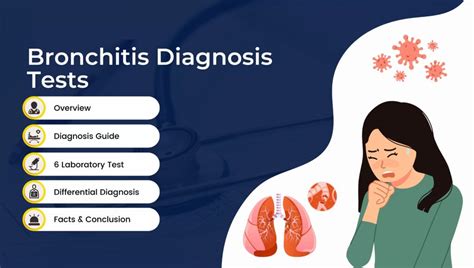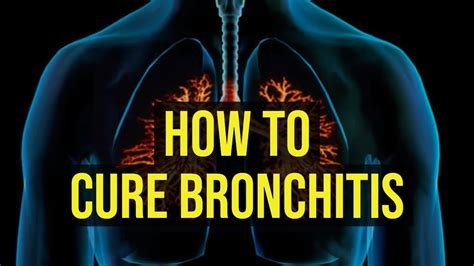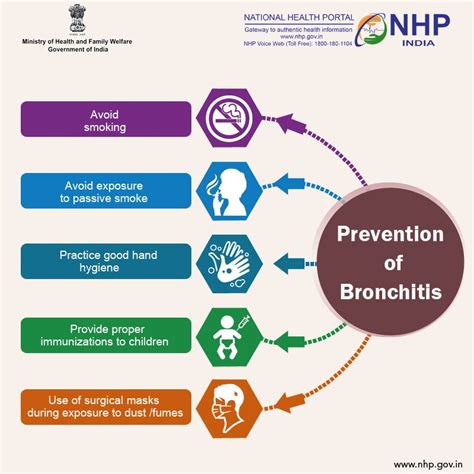Intro
Treat bronchitis effectively with 5 proven methods, including natural remedies, lifestyle changes, and medical treatments, to alleviate symptoms and prevent complications, promoting respiratory health and wellness.
Bronchitis is a common respiratory condition that affects millions of people worldwide. It is characterized by inflammation of the bronchial tubes, which carry air to and from the lungs. This inflammation can cause a range of symptoms, including coughing, wheezing, and shortness of breath. While bronchitis can be uncomfortable and even debilitating, there are several effective ways to treat and manage the condition. In this article, we will explore five ways to treat bronchitis, as well as provide an overview of the condition, its causes, and its symptoms.
Bronchitis can be acute or chronic. Acute bronchitis is a short-term condition that typically lasts for a few weeks, while chronic bronchitis is a long-term condition that can last for months or even years. Both types of bronchitis can be caused by a range of factors, including viral or bacterial infections, smoking, and exposure to air pollution. Symptoms of bronchitis can vary depending on the severity of the condition, but common symptoms include coughing, wheezing, and shortness of breath.
In addition to these symptoms, people with bronchitis may also experience fatigue, chest pain, and a feeling of tightness in the chest. If left untreated, bronchitis can lead to more serious complications, such as pneumonia or chronic obstructive pulmonary disease (COPD). Fortunately, there are several effective ways to treat bronchitis, and we will explore these in more detail below.
Understanding Bronchitis

Causes of Bronchitis
The causes of bronchitis can be divided into two main categories: infectious and non-infectious. Infectious causes of bronchitis include viral or bacterial infections, such as the common cold or flu. Non-infectious causes of bronchitis include exposure to air pollution, smoking, and other environmental factors. In some cases, bronchitis can also be caused by an underlying medical condition, such as asthma or COPD.Treatment Options for Bronchitis

Medication for Bronchitis
Medication is often the first line of treatment for bronchitis. There are several types of medication that can be used to treat bronchitis, including bronchodilators, expectorants, and antibiotics. Bronchodilators can help to open up the airways and improve breathing, while expectorants can help to thin and loosen mucus. Antibiotics may be prescribed if the bronchitis is caused by a bacterial infection.Lifestyle Changes for Bronchitis

Alternative Therapies for Bronchitis
There are several alternative therapies that can be used to treat bronchitis, including acupuncture, herbal remedies, and yoga. These therapies can help to reduce symptoms and improve overall health and well-being. However, it is essential to consult with a healthcare professional before trying any alternative therapies.5 Ways to Treat Bronchitis

- Stay Hydrated: Drinking plenty of fluids, such as water or herbal tea, can help to thin and loosen mucus, making it easier to cough up. This can help to reduce symptoms and improve overall health and well-being.
- Use a Humidifier: Dry air can irritate the bronchial tubes and make symptoms worse. Using a humidifier can help to add moisture to the air and reduce irritation.
- Try Steam Inhalation: Steam inhalation can help to loosen and clear mucus from the airways, making it easier to breathe. This can be done by inhaling steam from a bowl of hot water or by using a steam inhaler.
- Practice Good Hygiene: Practicing good hygiene, such as washing your hands regularly and avoiding close contact with others, can help to prevent the spread of infection and reduce the risk of complications.
- Get Plenty of Rest: Getting plenty of rest can help to reduce symptoms and improve overall health and well-being. This can involve taking time off work or school, avoiding strenuous activities, and getting plenty of sleep.
Preventing Bronchitis

Reducing the Risk of Complications
There are several steps that can be taken to reduce the risk of complications from bronchitis. These include getting plenty of rest, staying hydrated, and practicing good hygiene. It is also essential to seek medical attention if symptoms worsen or if you experience any of the following:- Difficulty breathing
- Chest pain or tightness
- Fever or chills
- Coughing up blood or yellow or green mucus
What are the symptoms of bronchitis?
+The symptoms of bronchitis can vary depending on the severity of the condition, but common symptoms include coughing, wheezing, and shortness of breath. People with bronchitis may also experience fatigue, chest pain, and a feeling of tightness in the chest.
How is bronchitis diagnosed?
+Bronchitis is typically diagnosed based on a physical examination and medical history. Your doctor may also order a chest X-ray or other tests to rule out other conditions.
Can bronchitis be prevented?
+While there is no surefire way to prevent bronchitis, there are several steps that can be taken to reduce the risk of developing the condition. These include quitting smoking, avoiding exposure to air pollution, and getting plenty of exercise.
What are the complications of bronchitis?
+The complications of bronchitis can vary depending on the severity of the condition, but common complications include pneumonia, chronic obstructive pulmonary disease (COPD), and respiratory failure.
How long does bronchitis last?
+The length of time that bronchitis lasts can vary depending on the severity of the condition and the effectiveness of treatment. Acute bronchitis typically lasts for a few weeks, while chronic bronchitis can last for months or even years.
We hope that this article has provided you with a comprehensive overview of bronchitis, its causes, symptoms, and treatment options. If you have any questions or concerns about bronchitis, please don't hesitate to reach out to a healthcare professional. Remember to stay hydrated, practice good hygiene, and get plenty of rest to help manage symptoms and reduce the risk of complications. By working together, we can help to prevent and treat bronchitis, and improve overall health and well-being.
